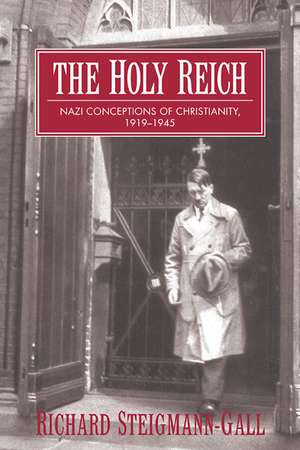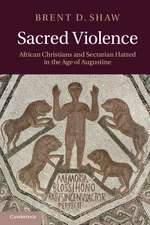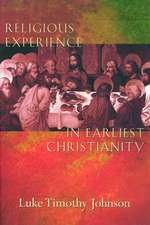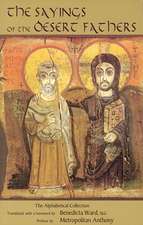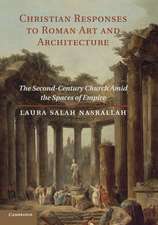The Holy Reich: Nazi Conceptions of Christianity, 1919–1945
Autor Richard Steigmann-Gallen Limba Engleză Paperback – 11 iul 2004
| Toate formatele și edițiile | Preț | Express |
|---|---|---|
| Paperback (1) | 197.51 lei 3-5 săpt. | |
| Cambridge University Press – 11 iul 2004 | 197.51 lei 3-5 săpt. | |
| Hardback (1) | 578.72 lei 6-8 săpt. | |
| Cambridge University Press – 20 apr 2003 | 578.72 lei 6-8 săpt. |
Preț: 197.51 lei
Nou
Puncte Express: 296
Preț estimativ în valută:
37.79€ • 39.56$ • 31.46£
37.79€ • 39.56$ • 31.46£
Carte disponibilă
Livrare economică 11-25 martie
Preluare comenzi: 021 569.72.76
Specificații
ISBN-13: 9780521603522
ISBN-10: 0521603528
Pagini: 312
Ilustrații: 15 b/w illus.
Dimensiuni: 151 x 229 x 20 mm
Greutate: 0.42 kg
Ediția:Pbk.
Editura: Cambridge University Press
Colecția Cambridge University Press
Locul publicării:New York, United States
ISBN-10: 0521603528
Pagini: 312
Ilustrații: 15 b/w illus.
Dimensiuni: 151 x 229 x 20 mm
Greutate: 0.42 kg
Ediția:Pbk.
Editura: Cambridge University Press
Colecția Cambridge University Press
Locul publicării:New York, United States
Cuprins
1. Positive christianity: the doctrine of the time of struggle; 2. Above the confessions: bridging the religious divide; 3. Blood and soil: the paganist ambivalence; 4. National renewal: religion and the New Germany; 5. Completing the reformation: the Protestant Reich Church; 6. Public need before private greed: building the people's community; 7. Gottgläubig: assent of the anti-Christians?; 8. The Holy Reich: some conclusions.
Recenzii
'The Holy Reich is both deeply researched and thoughtfully argued. It is the first comparative analysis of the religious beliefs of leading Nazis and a timely reminder of the intimate relations between liberal Protestantism and National Socialism. This is an important and original book by a talented young scholar that deserves as wide a readership as possible.' Michael Burleigh, Washington & Lee University and author of The Third Reich: A New History
'The Holy Reich is a brilliant and provocative work that will recast the whole debate on Christianity and Nazism. We have come to realize that Christianity embraced Nazism more than we used to believe. Now, in a work of deep revisionist import, Richard Steigmann-Gall shows us that the embrace was more than reciprocated.' Helmut Walser Smith, author of The Butcher's Tale: Murder and Anti-Semitism in a German Town
'There has been a huge amount of research on the attitude of the Christian Churches to the Nazis and their policies, but astonishingly until now there has been no thorough study of the Nazis' own religious beliefs. Richard Steigmann-Gall has now provided it. He has trawled through a lot of very turgid literature to show that active Nazis from the leadership down to the lower levels of the party were bitterly opposed to the Catholic Church, but had a much more ambivalent attitude to Protestantism and to Christianity in a wider sense … Far from being uniformly anti-Christian, Nazism contained a wide variety of religious beliefs, and Steigmann-Gall has performed a valuable service in providing a meticulously documented account of them in all their bizarre variety.' Richard J. Evans, University of Cambridge
'In the crowded field of Third Reich history, The Holy Reich really does have something original to say … an uncomfortably thought-provoking work of admirable scholarship.' The Times Higher Education Supplement
'… connects Nazism to liberal Protestantism in a convincing way.' The Sunday Times
'… excellently documented and deeply disturbing …' Church Times
'… an incisive study … this book is an admirable attempt to rethink the ethical and theological nature of Nazi ideology and practice. Steigmann-Gall is not trying to discard past perspectives or to act as a revisionist, but rather to deepen our current understanding of the relationship between Nazi ideology and Christian thought. In the process, he exposes lucidly the very contested nature of the meaning of Christianity as it emerged during the Nazi debates and the entire period of the third Reich.' European History Quarterly
' This is an important and well-researched study … a very thought provoking, controversial and important book which deserves a wide readership because it radically challenges some widely-held assumptions about Nazism''s pagan and/or anti-Christian core.' German History
'… fascinating and detailed …'. German Politics
'His archive work is impressive and the text's story is pieced together with both thought and art. Its sweep takes in everything one would expect and displays well the competing tendencies within Hitler's movement … More unusually it also discusses possible connections between Christianity and Nazi social policy …'. Reviews in History
'This rigorously researched and deeply disturbing book questions the scholarly consensus that Nazism was either unrelated to Christianity or actively opposed to it.' The Times (Weekend Review)
'… this book is one that will be easily included on anyone's bibliography of the Nazi regime. It is a book to be mulled over and considered deeply.' Open History
'This is a meticulous, even exhaustive book, offering a dense exploration of a great field of material. … a truly important book which will lead many scholars to refashion or sharpen their perspectives, and even to think again.' English Historical Review
'The Holy Reich is a brilliant and provocative work that will recast the whole debate on Christianity and Nazism. We have come to realize that Christianity embraced Nazism more than we used to believe. Now, in a work of deep revisionist import, Richard Steigmann-Gall shows us that the embrace was more than reciprocated.' Helmut Walser Smith, author of The Butcher's Tale: Murder and Anti-Semitism in a German Town
'There has been a huge amount of research on the attitude of the Christian Churches to the Nazis and their policies, but astonishingly until now there has been no thorough study of the Nazis' own religious beliefs. Richard Steigmann-Gall has now provided it. He has trawled through a lot of very turgid literature to show that active Nazis from the leadership down to the lower levels of the party were bitterly opposed to the Catholic Church, but had a much more ambivalent attitude to Protestantism and to Christianity in a wider sense … Far from being uniformly anti-Christian, Nazism contained a wide variety of religious beliefs, and Steigmann-Gall has performed a valuable service in providing a meticulously documented account of them in all their bizarre variety.' Richard J. Evans, University of Cambridge
'In the crowded field of Third Reich history, The Holy Reich really does have something original to say … an uncomfortably thought-provoking work of admirable scholarship.' The Times Higher Education Supplement
'… connects Nazism to liberal Protestantism in a convincing way.' The Sunday Times
'… excellently documented and deeply disturbing …' Church Times
'… an incisive study … this book is an admirable attempt to rethink the ethical and theological nature of Nazi ideology and practice. Steigmann-Gall is not trying to discard past perspectives or to act as a revisionist, but rather to deepen our current understanding of the relationship between Nazi ideology and Christian thought. In the process, he exposes lucidly the very contested nature of the meaning of Christianity as it emerged during the Nazi debates and the entire period of the third Reich.' European History Quarterly
' This is an important and well-researched study … a very thought provoking, controversial and important book which deserves a wide readership because it radically challenges some widely-held assumptions about Nazism''s pagan and/or anti-Christian core.' German History
'… fascinating and detailed …'. German Politics
'His archive work is impressive and the text's story is pieced together with both thought and art. Its sweep takes in everything one would expect and displays well the competing tendencies within Hitler's movement … More unusually it also discusses possible connections between Christianity and Nazi social policy …'. Reviews in History
'This rigorously researched and deeply disturbing book questions the scholarly consensus that Nazism was either unrelated to Christianity or actively opposed to it.' The Times (Weekend Review)
'… this book is one that will be easily included on anyone's bibliography of the Nazi regime. It is a book to be mulled over and considered deeply.' Open History
'This is a meticulous, even exhaustive book, offering a dense exploration of a great field of material. … a truly important book which will lead many scholars to refashion or sharpen their perspectives, and even to think again.' English Historical Review
Notă biografică
Descriere
Steigmann-Gall argues that Nazism was neither unrelated to Christianity nor actively opposed to it.
